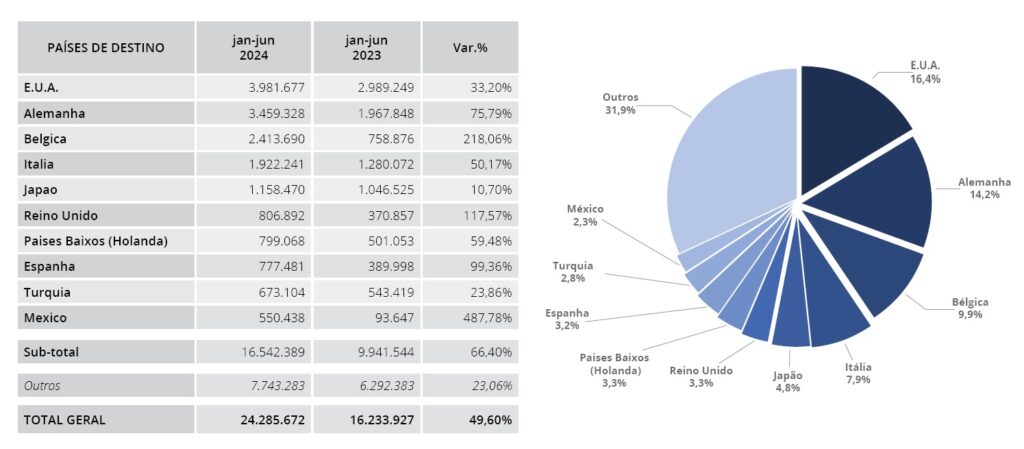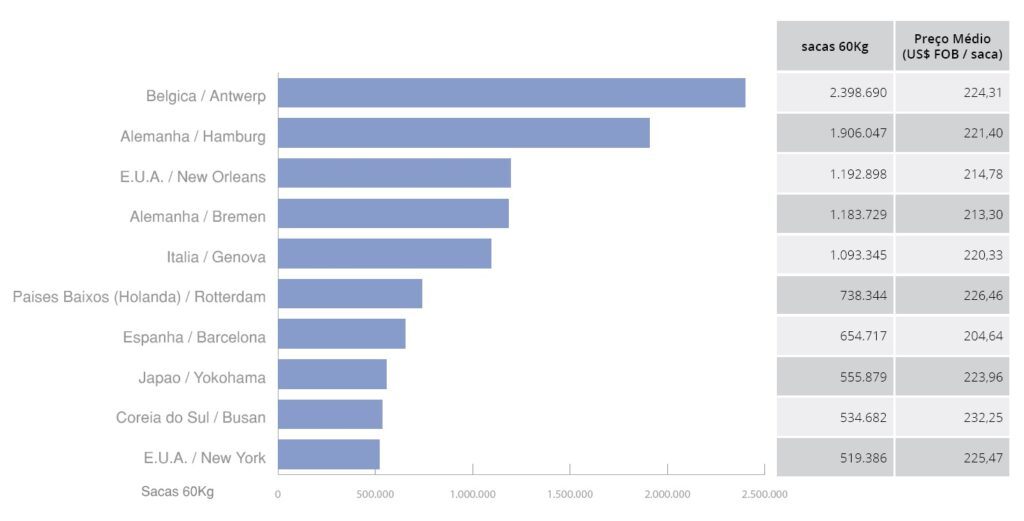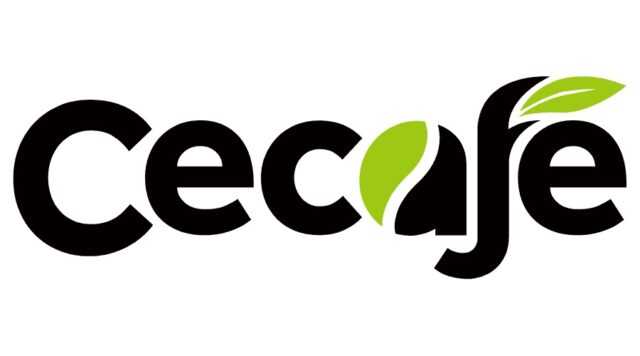MILAN – Brazilian coffee exports from record to record: according to Cecafé’s monthly data – released yesterday evening, Wednesday 10 July – during the 2023/24 harvest year (July-June) Brazil’s coffee shipments exceeded 47.3 million bags, up by almost a third compared to 2022/23. Exports in June and since the beginning of the year were also at record highs.
Last month, exports of all forms of coffee amounted to 3,573,013 bags: 35.7 per cent more than in June 2023.
Exports of green coffee were up by 43.8% to a total of 3,297,766 bags, of which 2,479,934 (+20.3%) were Arabica and 817,832 Robusta (+254.5%).
 On the other hand, sales of processed coffee (mainly soluble) were down by 19.1% to 275,247 bags.
On the other hand, sales of processed coffee (mainly soluble) were down by 19.1% to 275,247 bags.
Figures for the past 12 months show a 32.7% increase, to a total of 47,300,237 bags, which shatters the previous record of 45,675 set in 2020/21.
 Green coffee exports soared to 43,669,693 bags: up 37.2% from 2022/23. Arabica shipments come in at 35,431,343 bags, up 16.7%, but still below the all-time high of 36,958,084 bags set in 2020/21.
Green coffee exports soared to 43,669,693 bags: up 37.2% from 2022/23. Arabica shipments come in at 35,431,343 bags, up 16.7%, but still below the all-time high of 36,958,084 bags set in 2020/21.
Propelling Brazil towards this new record are, in fact, Robusta exports, with a more than five-and-a-half-fold increase (+461.1%) to 8,238,350 bags.
This figure pulverises the previous record of 4,730,981 bags, set in 2020/21. It also makes Brazil the world’s second largest exporter of Robusta coffee, behind Vietnam and ahead of Indonesia.
On a downward trend were only processed coffee sales (–4.7%), which nevertheless remained at the remarkable level of 3,630,544 bags.
Also at unprecedented levels were exports in all forms in the first half of 2024, which amounted to 24,285,672 bags, an increase on the year of 49.6%.
 Exports of green were up 56.7% to 22,414,591 bags, of which 18,146,340 were Arabica (+33.9%) and 4,268,251 Robusta (+463.7%). Processed coffee sales were slightly down (-2.9%) to 1,871,081 bags.
Exports of green were up 56.7% to 22,414,591 bags, of which 18,146,340 were Arabica (+33.9%) and 4,268,251 Robusta (+463.7%). Processed coffee sales were slightly down (-2.9%) to 1,871,081 bags.
Double or triple digit increases were recorded for all the main markets, starting with the USA (33.2%), Germany (+75.8%) and Belgium (+218.1%). Exports to Italy were up 50.2% to 1,922,241 bags.
 Among the ports of destination, Antwerp retains its first place ahead of Hamburg. New Orleans rises to third place bypassing Bremen, followed in turn by Genoa.
Among the ports of destination, Antwerp retains its first place ahead of Hamburg. New Orleans rises to third place bypassing Bremen, followed in turn by Genoa.
 According to the president of Cecafé, Márcio Ferreira, the result achieved by Brazilian exports reflects disparate contexts in the coffee market, involving less availability of other producing origins, but also the continuity of intense problems in logistics.
According to the president of Cecafé, Márcio Ferreira, the result achieved by Brazilian exports reflects disparate contexts in the coffee market, involving less availability of other producing origins, but also the continuity of intense problems in logistics.
“On the positive side, Brazil, with a better harvest, after two smaller harvest cycles, expanded its market share in global trade, occupying spaces left by reduced supply from other producers, such as Indonesia and Vietnam, mainly with conilon and Robusta. national”, he says.
“On the other hand, we continue to face intense logistical bottlenecks, with problems abroad due to the persistence of geopolitical conflicts, and, internally, with the exhaustion of the main Brazilian port, in Santos (SP), which has generated high additional and unforeseen costs for exporters, which, nevertheless, go to great lengths to honor commitments to international customers and maintain Brazil as the main global player.”

















